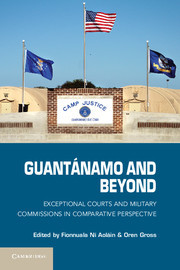Description
Guantánamo and Beyond
Exceptional Courts and Military Commissions in Comparative Perspective
Coordinators: Aoláin Fionnuala Ni, Gross Oren
This book brings together the viewpoints of leading scholars and policy makers on the topic of exceptional courts and military commissions.
Language: English
Subject for Guantánamo and Beyond:
Guantánamo and Beyond
Publication date: 09-2013
404 p. · 15.2x22.8 cm · Paperback
Publication date: 09-2013
404 p. · 15.2x22.8 cm · Paperback
Guantánamo and Beyond
Publication date: 08-2013
408 p. · 15.2x22.9 cm · Hardback
Publication date: 08-2013
408 p. · 15.2x22.9 cm · Hardback
Description
/li>Contents
/li>Biography
/li>
The Military Commissions scheme established by President George W. Bush in November 2001 has garnered considerable controversy. In parallel with the detention facilities at Guantánamo Bay, Cuba, the creation of military courts has focused significant global attention on the use of such courts to process and try persons suspected of committing terrorist acts or offenses during armed conflict. This book brings together the viewpoints of leading scholars and policy makers on the topic of exceptional courts and military commissions with a series of unique contributions setting out the current 'state of the field'. The book assesses the relationship between such courts and other intersecting and overlapping legal arenas including constitutional law, international law, international human rights law, and international humanitarian law. By examining the comparative patterns, similarities and disjunctions arising from the use of such courts, this book also analyzes the political and legal challenges that the creation and operation of exceptional courts produces both within democratic states and for the international community.
Part I. Military Commissions and Exceptional Courts in the United States: 1. The development of an exceptional court: the history of the American military commission David Glazier; 2. Military commissions in historical perspective: lessons from the US - Dakota war trials Carol Chomsky; 3. Contemporary law of war and military commissions Gary Solis; 4. Military commissions and the paradigm of prevention David Cole; 5. Prevention, detention, and extraordinariness Fiona de Londras; 6. In defense of federal criminal courts for terrorism cases in the United States Gabor Rona and Raha Wala; 7. Exceptional courts and the structure of American military justice Stephen I. Vladeck; 8. Exceptional courts in counterterrorism: lessons from the foreign intelligence surveillance act (FISA) William C. Banks; Part II. Exceptional Courts and Military Commissions Elsewhere: 9. The law working itself pure? The Canadian experience with exceptional courts and Guantánamo Kent Roach; 10. Vicious and virtuous cycles in prosecuting terrorism: the Diplock Court experience John Jackson; 11. Terrorism prosecution in the United Kingdom: lessons in the manipulation of criminalization and due process Clive Walker; 12. Trying terrorists: the Israeli perspective Emmanuel Gross; 13. Exceptional or not? An examination of India's special courts in the national security context Jayanth Krishnan and Viplav Sharma; Part III. International Law, Exceptional Courts and Military Commissions: 14. The right to a fair trial in an extraordinary court David Weissbrodt and Joseph Hansen; 15. Approaches and responses of the UN human rights mechanisms to exceptional courts and military commissions Alex Conte; 16. Exceptional Courts and the European Convention on Human Rights Steven Greer; 17. The legitimacy deficit of exceptional international criminal jurisdiction Yuval Shany.
Fionnuala Ní Aoláin is concurrently the Dorsey and Whitney Chair in Law at the University of Minnesota Law School and Professor of Law at the University of Ulster's Transitional Justice Institute in Belfast, Northern Ireland. Professor Ní Aoláin is the recipient of numerous academic awards and honors, including a Fulbright scholarship, the Alon Prize, the Robert Schumann Scholarship, a European Commission award, and the Lawlor fellowship. She has published extensively in the fields of emergency powers, conflict regulation, transitional justice, and sex-based violence in times of war. Her book Law in Times of Crisis (Cambridge University Press, 2006, with Oren Gross) was awarded the American Society of International Law's pre-eminent prize in 2007 - the Certificate of Merit for Pre-eminent Contribution to Creative Scholarship. She is also the author of On the Frontlines: Gender, War, and the Post-Conflict Process (2011). She was appointed to the Executive Council of the American Society of International law in 2010 for a three-year term. She is Chair of the Board for the International Women's Program OSI.
Oren Gross is the Irving Younger Professor of Law and Director of the Institute for International Legal and Security Studies at the University of Minnesota Law School. Professor Gross has received numerous academic awards and scholarships, including a Fulbright scholarship and British Academy and British Council awards. Between 1986 and 1991, Professor Gross served as a senior legal advisory officer in the international law branch of the Israeli Defense Forces' Judge Advocate General's Corps. Professor Gross's work has been published extensively, and his articles have appeared in leading academic journals such as the Yale Law Journal, the Yale Journal of International Law, the Michigan Journal of International Law, the Minnesota Law Review, and the Cardozo Law Review. His book Law in Times of Crisis (Cambridge University Press, 2006, with Fionnuala Ní Aoláin) wa
Oren Gross is the Irving Younger Professor of Law and Director of the Institute for International Legal and Security Studies at the University of Minnesota Law School. Professor Gross has received numerous academic awards and scholarships, including a Fulbright scholarship and British Academy and British Council awards. Between 1986 and 1991, Professor Gross served as a senior legal advisory officer in the international law branch of the Israeli Defense Forces' Judge Advocate General's Corps. Professor Gross's work has been published extensively, and his articles have appeared in leading academic journals such as the Yale Law Journal, the Yale Journal of International Law, the Michigan Journal of International Law, the Minnesota Law Review, and the Cardozo Law Review. His book Law in Times of Crisis (Cambridge University Press, 2006, with Fionnuala Ní Aoláin) wa
© 2024 LAVOISIER S.A.S.




